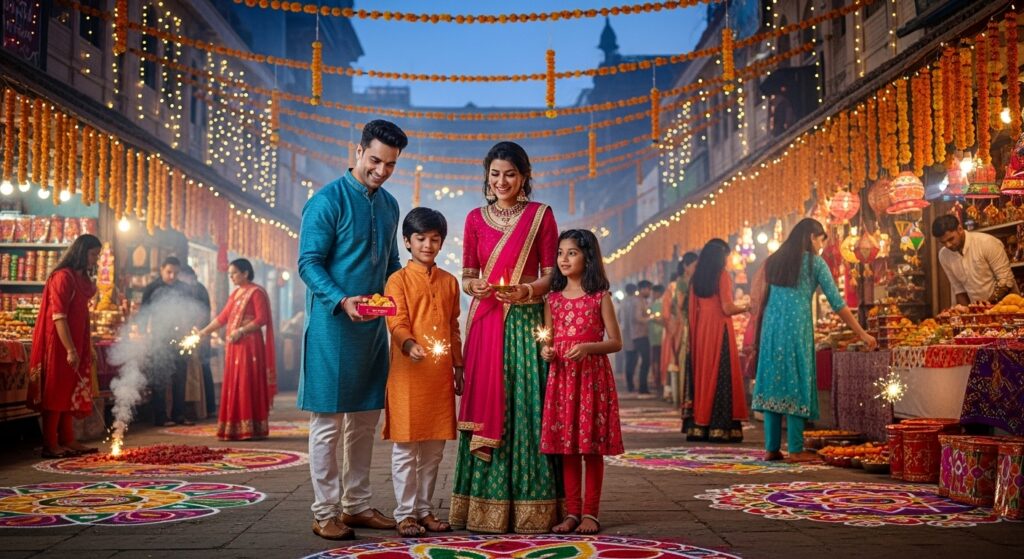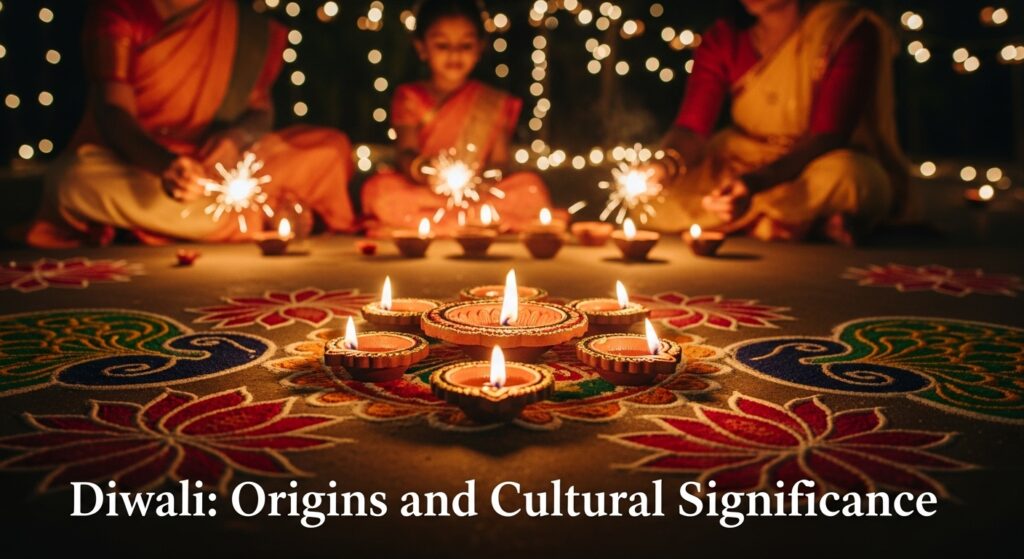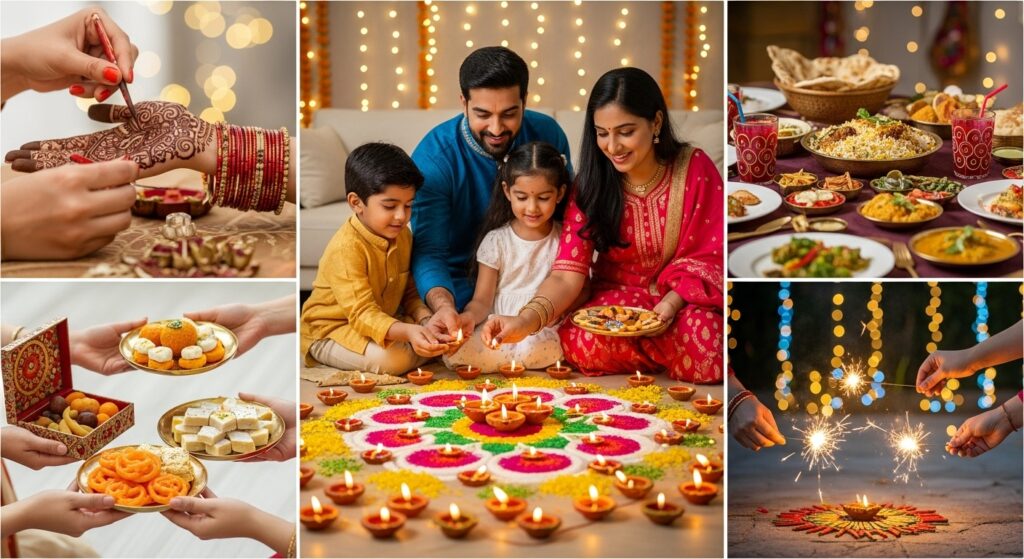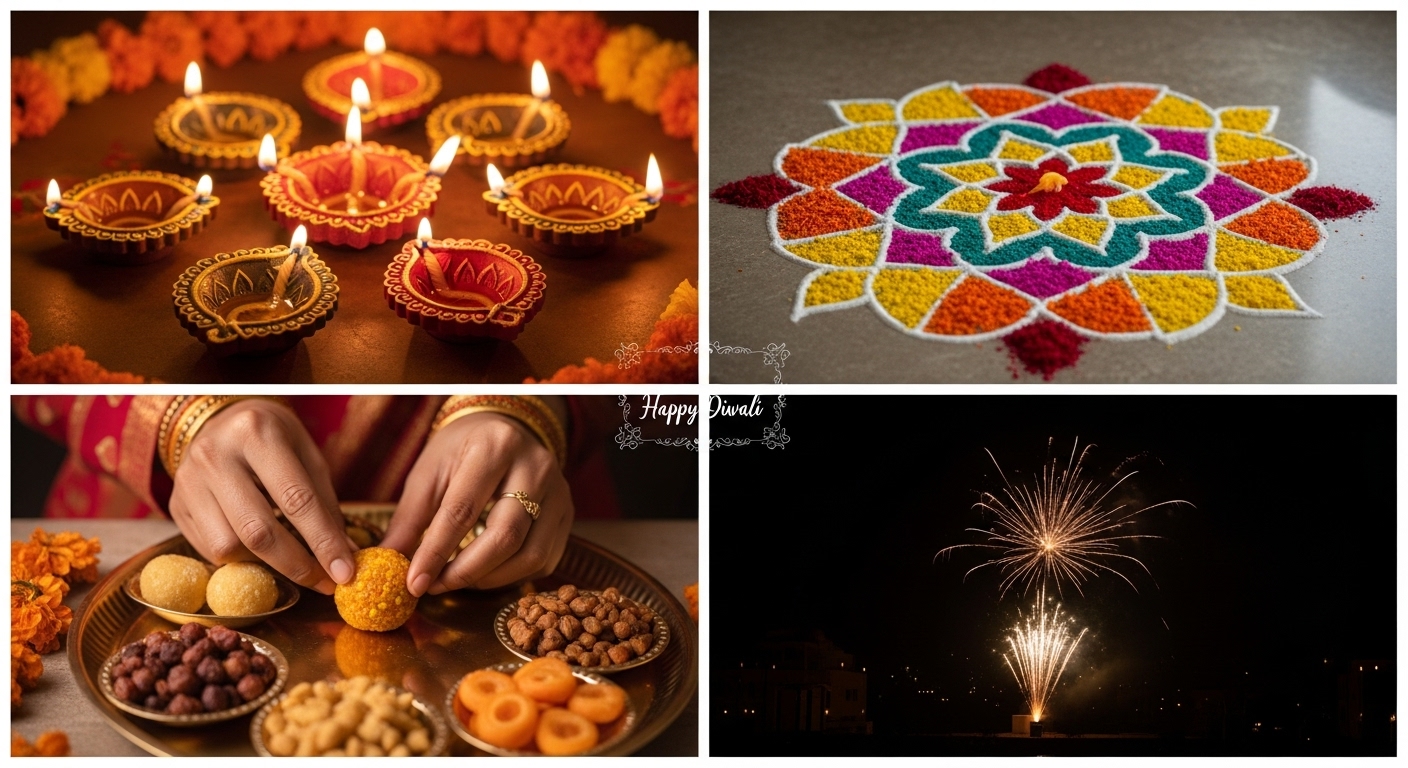Discover the meaning, traditions, and global celebration of Diwali — the Hindu Festival of Lights symbolizing good over evil and light over darkness. Learn when and how it’s celebrated across cultures.
Every year, millions of people across the globe light up their homes, streets, and hearts to celebrate Diwali — the Festival of Lights.
More than just a religious holiday, Diwali has become a universal symbol of hope, unity, and renewal, celebrated by Hindus, Sikhs, Jains, and even non-Hindus who embrace its spirit of joy and togetherness.
As families gather to exchange gifts, share sweets, and light clay lamps known as diyas, the festival radiates a message that transcends borders: light always triumphs over darkness, and goodness always prevails over evil.

What Is Diwali? The Festival of Lights Explained
The word Diwali comes from the Sanskrit term Deepavali, which translates to “a row of lights.” These lights — traditionally oil lamps or candles — illuminate homes and temples during the festival, symbolizing inner light and knowledge conquering ignorance and despair.
According to the Hindu American Foundation, Diwali represents the awakening of the divine light within each individual — a reminder that positive energy and self-awareness can overcome any darkness.
Culturally, the festival also invites Goddess Lakshmi, the deity of prosperity and abundance, into homes and workplaces. Many believe that Lakshmi only enters clean and well-lit spaces, which is why devotees prepare days in advance with thorough cleaning and decorations.

Origins and Cultural Significance
Diwali’s origins are deeply rooted in ancient India, with varying regional interpretations.
- In Northern India, it marks Lord Rama’s return to Ayodhya after 14 years of exile and his victory over the demon king Ravana.
- In Southern India, it celebrates Lord Krishna’s triumph over Narakasura, symbolizing the end of evil and ignorance.
- For Sikhs, Diwali commemorates the release of Guru Hargobind Ji, the sixth Guru, from imprisonment — a powerful symbol of freedom and justice.
- Jains observe Diwali as the day Lord Mahavira attained nirvana, representing spiritual liberation.
Despite these differences, every community shares one message: light symbolizes knowledge, love, and goodness, uniting all who celebrate.
When Is Diwali Celebrated in 2025?
Diwali is observed during the Hindu month of Kartik, typically falling between mid-October and mid-November.
In 2025, Diwali will be celebrated on Monday, October 20, with festivities beginning two days earlier on Saturday, October 18, marking the start of Dhanteras — the traditional shopping and preparation day.
The celebrations span five days, each with its own cultural importance, culminating in the grand night of Diwali when homes glow brightest and communities come alive with fireworks, music, and joy.
How Do People Celebrate Diwali Worldwide?
While traditions differ from one region to another, Diwali celebrations generally include:
Cleaning and Decorating Homes – Devotees deep-clean and adorn their homes with lights, lanterns, and rangoli — colorful designs made from powder, flowers, or rice symbolizing good fortune.
Lighting Diyas and Candles – Rows of clay lamps illuminate doorways and windows, creating a warm and inviting ambiance believed to attract prosperity and divine blessings.
Festive Gatherings and Feasts – Families and friends gather for prayers (puja), exchange gifts, and enjoy rich traditional foods and sweets such as ladoo, barfi, and jalebi.
Fireworks and Joyous Celebrations – Firecrackers and sparklers light up the night sky, marking the victory of light over darkness and filling the air with excitement.
Acts of Charity and Reflection – Many also use the occasion for dana (charitable giving) and seva (selfless service), reflecting on gratitude and compassion toward others.

Global Recognition of Diwali
Once celebrated primarily in South Asia, Diwali is now a global cultural phenomenon.
Major cities like London, New York, Toronto, and Singapore host grand Diwali events, complete with fireworks, parades, and performances.
In the United States, several states such as New York, Pennsylvania, and Connecticut have recognized Diwali as an official or state holiday. California’s Diwali Bill, taking effect in 2026, will allow schools and state offices to close in observance.
Beyond its religious roots, Diwali has become a global symbol of diversity and cultural harmony, akin to Christmas and Hanukkah, celebrated by people of all faiths who share its message of peace and positivity.
Frequently Asked Questions (FAQs):
Q1. Why is Diwali called the Festival of Lights?
Because it celebrates the symbolic victory of light (knowledge and goodness) over darkness (ignorance and evil).
Q2. Who celebrates Diwali?
Primarily Hindus, Sikhs, Jains, and some Buddhists — though the festival is widely embraced by people of various cultures and religions worldwide.
Q3. How long does Diwali last?
Traditionally, Diwali lasts for five days, each dedicated to specific rituals and celebrations.
Q4. What are the main foods eaten during Diwali?
Sweets (mithai), snacks, and festive dishes like samosas, kheer, and gulab jamun are popular across regions.
Q5. Is Diwali a public holiday everywhere?
No, but several countries and states have officially recognized it. Public schools in New York City now close for Diwali, reflecting its growing cultural significance.
Diwali2025 #FestivalOfLights #GlobalCelebration #CulturalTraditions #HinduFestival #LightOverDarkness #LakshmiPuja #DiwaliVibes #SpiritualAwakening #UnityInDiversity


